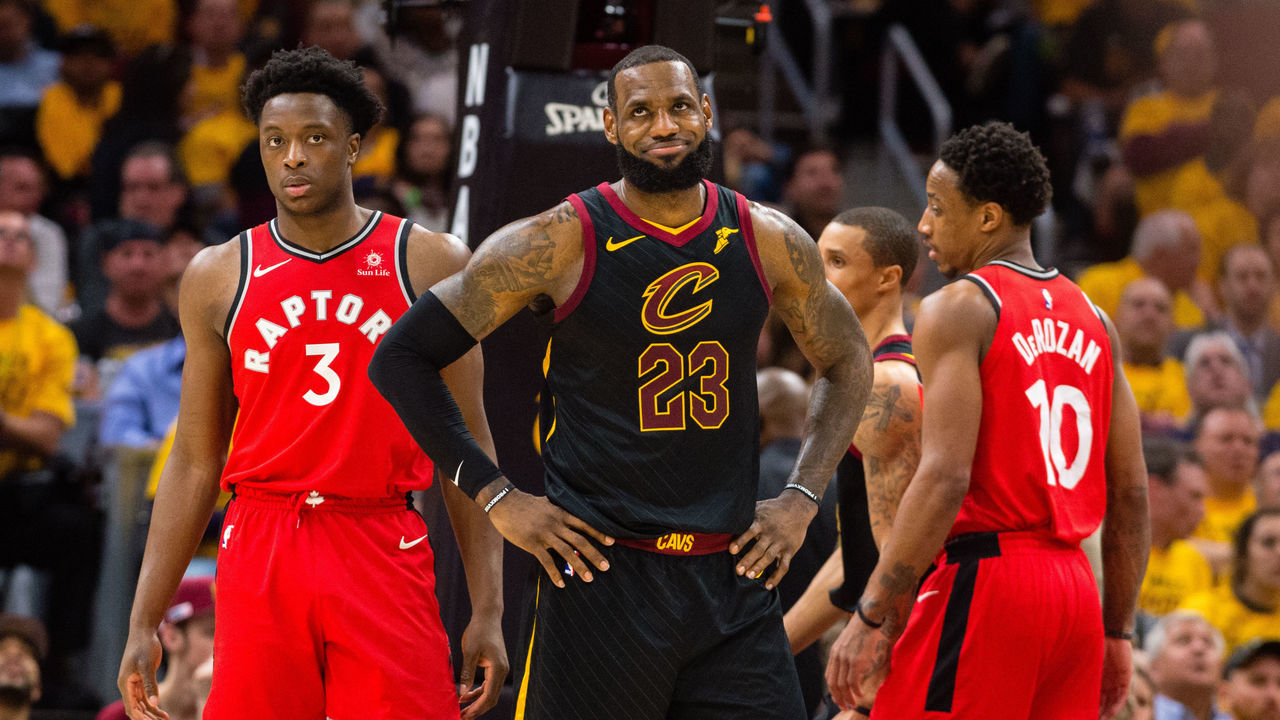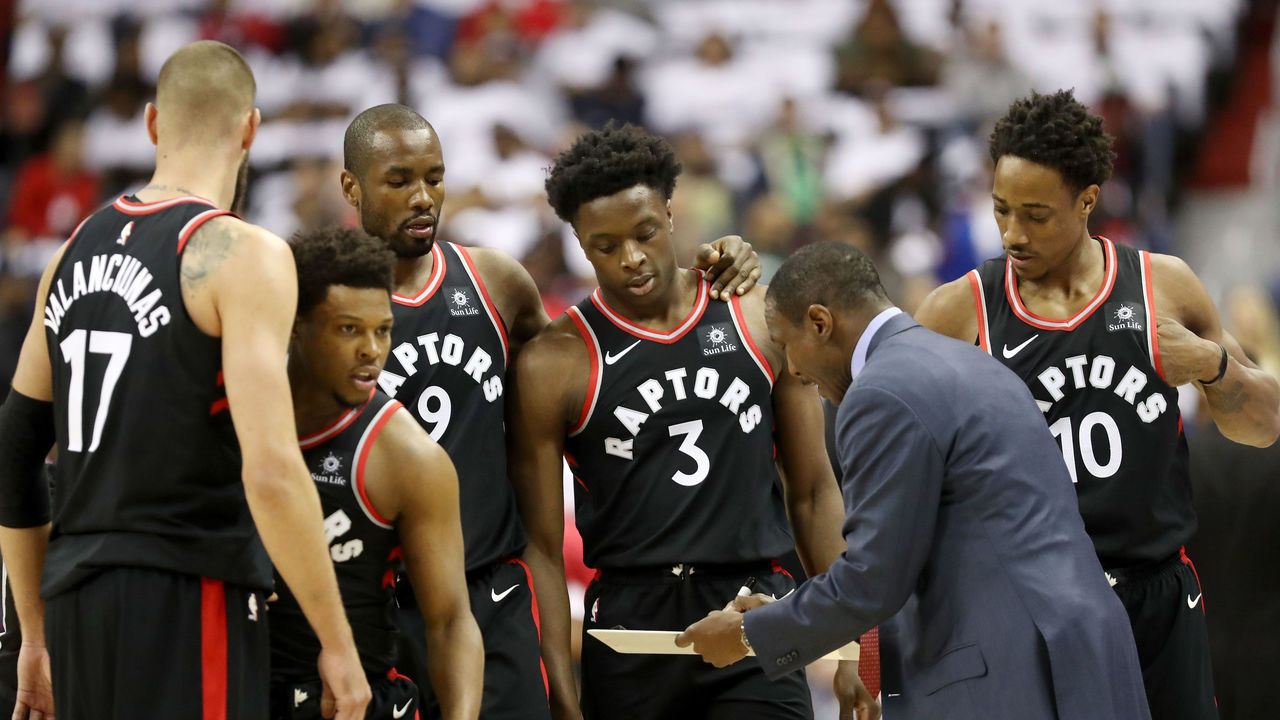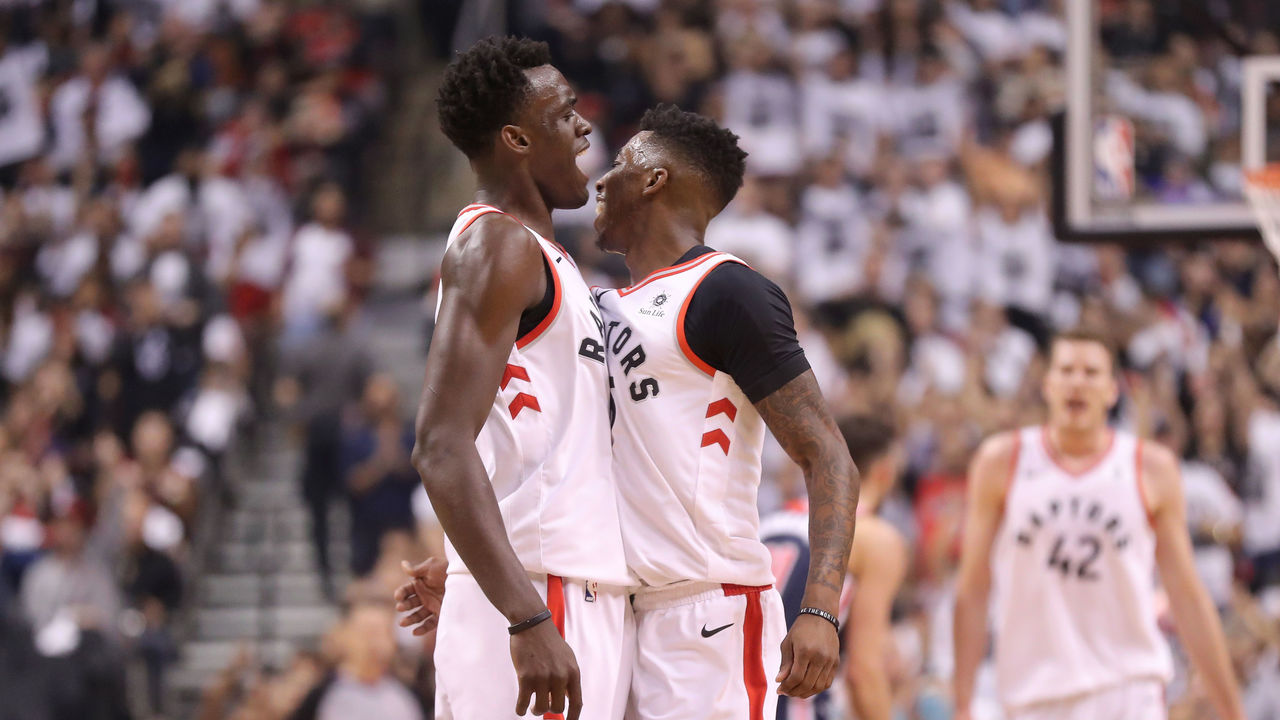The greatest trick the Raptors pulled was convincing us they had a chance
In a way, everything that happens feels inevitable after it happens. The moment an event takes place, a whole shelf of possibilities of what might have taken place falls away, and, suddenly, you have to strain to imagine the fanciful alternate reality you once considered plausible. "Could be" no longer exists, then; there is only what is. And how could you have not seen that thing coming? How could it have happened any other way?
That feeling of inevitability takes hold anytime LeBron James and the Cleveland Cavaliers dismissively dispatch the Toronto Raptors in the playoffs. Leading a team through the Eastern Conference to the Finals has become an annual rite of spring for James, as reliable as the concurrent annual Raptors meltdown. This year it was going to be different, though. These weren't the same Raptors, or the same Cavs. The Raptors were deeper, more balanced, more confident than ever. The Cavs were thinner, more ragged, more LeBron-dependent, and more defensively deficient. This time, there was good reason to ignore history and buy into the something of the present.
To get to that point, an already good Raptors team, stung by the humiliation of being swept out of the 2017 playoffs, had been forced to look at themselves in the mirror and demand self-improvement. They overhauled their identity, emphasizing fluidity and ball movement, excising mid-rangers in favor of 3-pointers, and tweaking their defensive scheme to coax opponents into the very shots they were cutting out of their own diet. They fostered meaningful growth in their youngsters and veterans alike, built up their bench into one of the league's best units, and emboldened their role players to take on more significant playmaking duties.
The upshot: They produced a top-three offense, top-five defense, and the second-best net rating in the league. They won a franchise-record 59 games, and earned the No. 1 seed in the East for the first time ever. By Basketball-Reference's Simple Rating System, they had the 20th-best regular season of the last 20 years. They didn't lose three straight games all season, and lost by double-digits just five times.
From their internal development, to their squeaky-clean bill of health, to the timing of it all - having their youth uprising overlap with their vets' primes, in the same year Cleveland lost Kyrie Irving, and the Celtics lost Gordon Hayward (and later Irving) - the Raptors had just about everything go right. And for their troubles, they got handed another, equally embarrassing beatdown by their personal bogeyman. A second-round sweep, for a second straight year. A third straight playoff run kneecapped by King James and his royal entourage. The first sweep suffered by a 1-seed before the conference finals since 1969. A season-ending, 35-point pantsing in Game 4 that more than doubled the Raptors' worst margin of defeat during the regular season.
And in the end, that familiar feeling: the crushing weight of inevitability. As if this was ever going to happen any other way.

The Raptors shattered expectations in the regular season, took care of business (despite some antsy moments) in the first round against the Washington Wizards, finally got the best version of Kyle Lowry in the playoffs, and slayed their decade-old Game 1 demons along the way. But the Cavs series was always the test on which this reimagined iteration of the team would be judged. They spent the season building toward it, just as they'd spent the previous season steeling for the 2017 rematch. Two years of mental, physical, and tactical prep for this matchup, with zero postseason wins to show for it.
The Pacers took more games off the Cavs in the first round than the Raptors have taken in three series combined.
You could've blinked and missed this one. There were the late-game yips and countless duffed layups that cost Toronto an eminently winnable Game 1, followed by LeBron's soul-obliterating fadeaway party in Game 2, a spirited Raptors comeback that was quashed by LeBron's buzzer-beating, one-legged running bank shot in Game 3, and sweet surrender in Game 4. And that was it.
In one ignominious week, the franchise's great litmus test was over; their landmark season, kaput. Now here they are again, soul-searching, staring down another identity crisis, considering a coaching change, and bemoaning a "wasted year." It's astonishing how quickly all that regular-season feel-goodery melted away; how the best season in franchise history wound up feeling like so many other seasons in franchise history. Does refining the process matter if the big-picture outcome doesn't change?
For what it's worth, their revamped offensive system did exactly what it was supposed to do. After four straight years watching their offense careen into a gorge in the postseason, the Raptors actually slightly improved on their regular-season mark this spring. At the time of their elimination they owned the second-best offensive rating of this year's playoffs, behind only the Rockets. And yet, it made no difference, because the Raptors got tight and gagged away Game 1, DeMar DeRozan disappeared when they needed him most, their ballyhooed depth didn't end up mattering one whit, and, with the exception of OG Anunoby, their youngsters didn't show up.
Most damningly, they got eviscerated at the defensive end, where the Cavs had them chasing their own tails and lunging at ghosts; overhelping and overswitching, leaving the wrong shooters open in the wrong spots, getting burned by back-cut after back-cut, and biting on every single pump-fake thrown their way. No coherent game plan came through in how they played. Were they hedging on LeBron-George Hill pick-and-rolls, or switching? Were they doubling on post mismatches, or staying home? Where was the help coming from when their bigs got dragged out to the perimeter by Kevin Love? Was anyone going to track Kyle Korver off the ball? From one possession to the next, the Raptors didn't seem to know.
It left them scrambling for answers and adjustments, doing away with their regular rotation and running out combinations that had hardly played together. All the measured, instinctual button-pushing Dwane Casey had done with his lineups during the season started to get more frenetic, and by the time Lucas Nogueira checked into Game 4 in the second quarter it felt like desperate, reactionary grasping.

At its heart, though, this is still a personnel problem. With Serge Ibaka in a near-permanent funk, the Raptors had no natural defender for Love. They had only one guy who could come close to matching up physically with LeBron, and he was a rookie. When the Cavs' role players are rolling, and LeBron is flanked by shooters, there is simply no good answer; you will inevitably be forced into choosing between multiple bad options, and LeBron will see to it that the choice you make is the wrong one. Ultimately, that's what exceptional players - and LeBron more than anyone - will do to you: make you forget what you knew, abandon your defensive principles, and succumb to sheer panic.
And that's the thing the Raptors can't really purport to do. They might force some tweaks, but none of their players are striking terror into the heart of a playoff opponent, or blowing their game plan to bits. One of the Raptors' most vindicating achievements this year was forcing the Wizards to ditch their trapping defense after shredding it with crisp passing and cuts in Games 1 and 2. Score one for the culture reset, but the Wizards managed just fine in a more traditional pick-and-roll scheme. In the playoffs, the Raptors tend to be the team that compromises and tinkers the most, and while some might consider that an indictment of Casey, it speaks more to the team's lack of elite talent.
That's also part of the appeal, though. Sports are a way to tell stories about how the world works, or ought to work, which is maybe why it was tempting to believe in this year's Raptors, or in similarly superstar-less, aspirational teams like the 2015 Hawks or 2013 Nuggets before them. There's a desire to believe that certain established patterns can be reversed, that longstanding challenges can be overcome, and that you can find creative workarounds to gigantic roadblocks with the right alchemy of attitude, ingenuity, unity, and grit. There's a reason people romanticize the 2014 Spurs, 2011 Mavericks, and 2004 Pistons.
Every year for the last five years, while keeping the same elemental core in place, the Raptors have come back a little bit different, a little bit better, a little bit more certain of who they are. That's not going to continue forever, and this latest playoff flameout almost certainly spells the end of the short-lived era of consensus Raptors belief, but that's OK. Not every team can win a championship, and it's becoming increasingly clear that this Raptors core cannot. But there also aren't many teams who can do what the Raptors have done, which is come back each year and play well enough to make you forget, for a while, what you know about them.

And yes, every year that collective memory gets longer, and belief becomes a tougher sell, internally and externally, and eventually there are diminishing returns; every year the fan base gets a little more jaded - it seems like even the playoff crowd outside Air Canada Centre gets a little thinner, a little more reticent each spring - and it's hard to imagine how the players are going to engender the necessary self-belief after having the season they just had and seeing it end the way it did.
But whether or not the Raptors alter their nucleus or dramatically change course this summer, they'll come back and keep trying to push that boulder up the mountain, doomed to fail, surely, but probably still convincing enough in the effort to make you believe, at some point, that next season can be different. But what's so bad about false hope, really? At the end of the day, isn't that what this whole enterprise is about? Sports fandom exists in a willfully delusional space; belief is what makes it worthwhile.
We all live under the specter of mortality, learn to cope with it, and fill our lives with stuff that distracts us from the churn of inevitability. We mostly try to be the best versions of ourselves, and to live with purpose, and find meaning wherever we can, while we can. That's the Raptors in the regular season.
In any case, recency bias and our overemphasis on playoff performance suggests history will not look kindly on this Raptors team. Which is a shame, because this team had a unique quality about it, and was wickedly fun to watch, and was really quite good, difficult as that may be to remember in the wake of another playoff pounding. They deserved a better ending than the one they wrote for themselves.
For a few months, though, this was a team worth believing in, and that alone is worth celebrating.